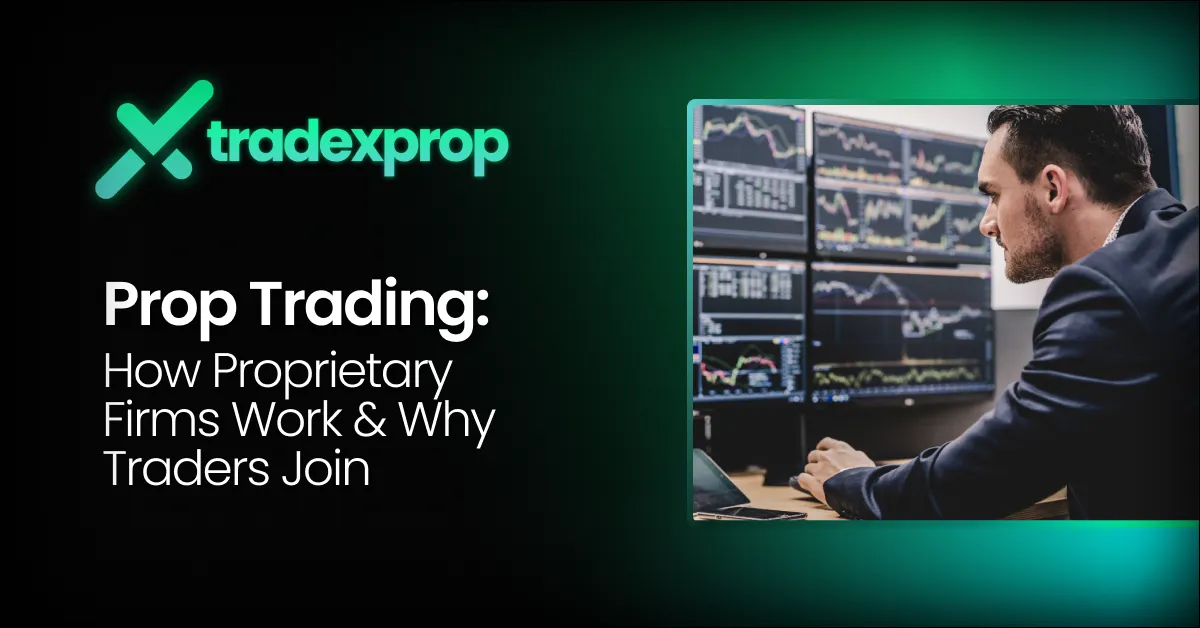In the world of financial markets, traders have two primary paths: trade their own capital or trade for a prop firm (short for proprietary firm). Unlike traditional trading firms, where traders manage client funds, proprietary trading firms allow traders to trade the firm’s capital in exchange for a profit split.
This article explores how prop trading works, why traders choose prop firms, and the pros and cons of joining a proprietary firm.
What is Prop Trading?
Proprietary trading (prop trading) occurs when a financial firm, hedge fund, or institution trades the firm’s own money instead of client funds. The goal is to generate direct profits rather than earning commissions from customers’ trades.
How Does a Prop Firm Work?
A proprietary firm provides its traders with access to capital, advanced trading tools, and risk management strategies. In return, traders split their profits with the firm, following a pre-determined payout structure.
Typical prop trading structures include:
- Firm-Funded Traders – The firm provides capital, and traders execute trades based on firm strategies.
- Evaluation-Based Models – Traders pass a challenge to prove their profitability before receiving capital.
- Leverage & Risk Controls – Prop firms impose rules to manage risk, such as daily loss limits and drawdown restrictions.
Why Traders Join a Prop Firm
Many traders opt for proprietary trading firms instead of trading their own capital. Here’s why:
1. Access to Capital
Prop firms provide traders with substantial funding, allowing them to trade with larger positions and maximize profit potential.
2. Leverage & Buying Power
Most prop firms offer higher leverage than retail brokers, enabling traders to control larger positions with less capital.
3. Profit Splits & Earning Potential
Traders at proprietary firms keep a percentage of their profits, usually ranging from 50% to 90%, depending on the firm’s structure.
4. No Personal Risk on Capital
Since traders use the firm’s money, they do not risk personal funds beyond the initial evaluation fee (if applicable).
5. Advanced Technology & Resources
Prop firms provide access to professional trading platforms, proprietary algorithms, and institutional-grade data, which retail traders often lack.
How Prop Trading Differs from Retail Trading
| Feature | Proprietary Trading | Retail Trading |
|---|---|---|
| Capital Source | Firm’s capital | Trader’s own money |
| Leverage | Higher leverage | Limited leverage (regulated) |
| Risk Exposure | Firm controls risk | Full personal risk |
| Profit Structure | Profit split with firm | 100% profit retained |
| Tools & Technology | Institutional-level | Retail platforms |
Prop firms offer traders higher capital, better tools, and reduced personal risk, but they require traders to prove their profitability before funding.
Types of Proprietary Trading Firms
1. Market-Making Prop Firms
These firms focus on providing liquidity by constantly quoting buy and sell prices. They profit from the bid-ask spread rather than directional market moves.
2. High-Frequency Trading (HFT) Firms
HFT prop firms use algorithmic trading to execute thousands of trades in milliseconds, leveraging advanced technology for profit.
3. Retail Prop Firms
These firms offer funded trader programs where individuals pass an evaluation to access capital. Popular retail prop firms include FTMO, MyForexFunds, and The5ers.
4. Hedge Fund-Like Prop Firms
Some prop firms operate like mini hedge funds, allowing traders to manage firm capital under structured strategies.
Pros & Cons of Trading for a Prop Firm
Pros:
✔ No Personal Capital at Risk – Traders use the firm’s money instead of their own.
✔ Higher Leverage – Access to institutional-level capital.
✔ Better Technology & Execution – Advanced software, liquidity, and tools.
✔ Fixed Costs & No Commission Spreads – Many firms offer low-cost trading.
✔ Scalability – Successful traders can scale their capital over time.
Cons:
✖ Profit Splits – Traders must share profits with the firm.
✖ Strict Risk Management – Daily loss limits and drawdown rules apply.
✖ Evaluation Challenges – Many firms require passing profitability tests before funding.
✖ Firm-Specific Rules – Traders must adhere to firm regulations on position sizing, risk, and strategy.
How to Choose the Right Prop Firm
Not all prop firms are created equal. Here’s what to consider before joining:
- Profit Split & Fees – Understand the payout ratio and any evaluation costs.
- Risk Management Rules – Check drawdown limits, maximum loss, and stop-out levels.
- Leverage & Buying Power – Some firms offer higher leverage than others.
- Trading Instruments – Ensure the firm offers forex, stocks, futures, or crypto based on your preference.
- Reputation & Reviews – Research online feedback to avoid scam firms.
| Prop Firm | Profit Split | Minimum Evaluation Fee |
|---|---|---|
| FTMO | Up to 90% | $93 |
| Tradexprop | Up to 90% | $35 |
| The5ers | Up to 80% | $39 |
| FundingPips | Up to 80% | $36 |
Is Prop Trading Right for You?
Who should consider trading for a prop firm?
✅ Traders with a profitable strategy but limited capital
✅ Traders who want to scale up with firm funding
✅ Traders comfortable with risk management rules
✅ Traders seeking leverage and access to institutional tools
Who should avoid prop trading?
❌ Beginners with no trading experience
❌ Gamblers
❌ Traders unwilling to follow strict firm rules
❌ Traders who dislike profit-sharing models
Final Thoughts on Prop Trading
Joining a proprietary trading firm offers traders a chance to access significant capital, leverage, and advanced tools while limiting personal risk. However, it requires discipline, risk management, and a profitable strategy.
Before joining a prop firm, carefully evaluate the profit split, risk rules, and costs to find the best fit for your trading style.
1. What is a prop firm?
A prop firm (short for proprietary trading firm) is a financial institution that provides traders with access to firm capital for trading financial markets. Instead of using personal funds, traders execute trades using the firm’s money and share a percentage of the profits. Prop firms typically offer advanced trading platforms, risk management tools, and leverage that exceed retail broker limits.
2. Which is the best prop firm?
The best prop firm depends on a trader’s goals, experience level, and trading style. Some of the most reputable prop firms include:
- FTMO – Offers up to 90% profit splits, strict evaluation processes.
- Tradexprop – Up to 90% profit split, lower entry fees.
- The5ers – Focuses on long-term trader development with scaling opportunities.
- FundingPips – Provides flexible evaluation models for traders.
Traders should consider profit splits, evaluation fees, risk management rules, and trading conditions when choosing a prop firm.
3. Is a prop firm legal in Malaysia?
Yes, prop firms are legal in Malaysia, but they operate in a gray regulatory area. While Malaysian authorities, such as the Securities Commission Malaysia (SCM), regulate financial markets, many prop firms are based offshore. Traders in Malaysia should ensure that the prop firm they join is reputable and not involved in financial fraud or scams.
4. Are prop firms legal?
Yes, prop firms are legal in most countries, but their operations may differ based on financial regulations.
- In the U.S. and U.K., prop firms operate under financial licensing requirements.
- In Europe, prop trading is permitted but must comply with MiFID II regulations.
- Some regions, like China and India, have restrictions on forex prop trading.
Traders should always verify a prop firm’s transparency, regulatory compliance, and business model before joining.






